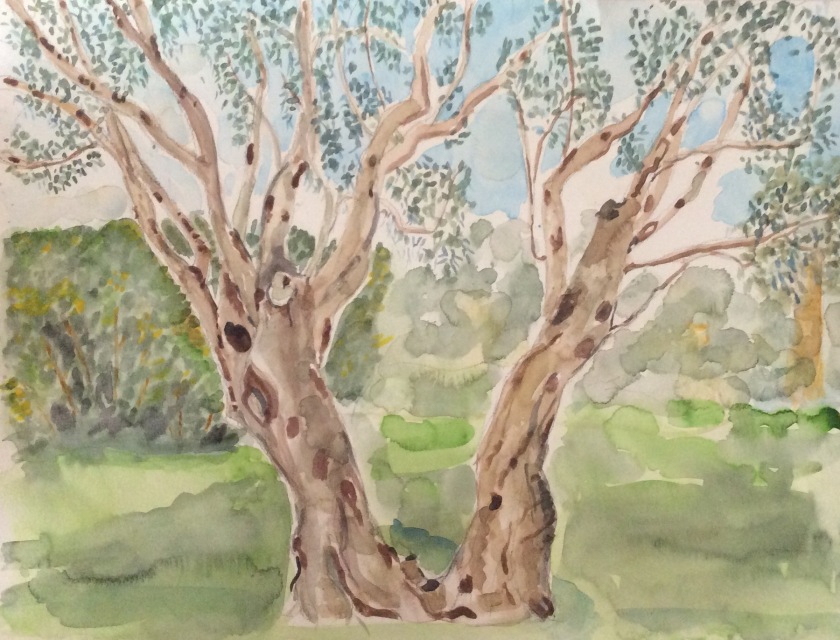‘I will give you water,’ said Poseidon, striking the Acropolis rock with his trident. A salty fountain sprang up.
‘And I will give you a tree,’ said the goddess Athena, striking the rock with her spear. An olive tree sprang up. ‘Its fruit will feed you, its leaves will give you shade, and and its wood provide fuel.’
There was a vote, and Athena won, thus giving her name to the city of Athens.
At the first Olympic Games, held in 776 BC in honor of Zeus,
athletes were massaged with olive oil in the belief that the wisdom, power and strength of Athena would be bestowed upon them. The winners, of this and all subsequent games, were also awarded olive leaf crowns and olive oil.

the most beloved of all’
Poem by Kostis Palamas(1859-1943)
The olive tree was considered sacred. It was believed that if you polished a statue of Zeus with olive oil, Zeus would be so honored that he would grant you a long and happy life. The 13m-high ivory and gold statue of Zeus at Olympia made by the famous sculptor Phidias (one of the seven wonders of the ancient world) was always kept polished with olive oil.
Olive trees are ancient. Fossilized leaves, believed to be as much as 60.000 years old, have been found on the volcanic island of Santorini. However, it appears that olive trees as we know them today originated approximately 6,000 to 7,000 years ago in the region corresponding to ancient Persia and Mesopotamia. But they were first cultivated commercially in Crete in the Minoan era, as can be seen on the murals in Knossos – they may have been the source of the wealth of the Minoan civilization. Later, Ancient Greek philosopher Aristotle further developed the cultivation of the olive into a science. Olive oil was a valuable trade commodity, and a main source of prosperity in Classical Athens. It was also used to anoint kings, athletes and warriors.
Olive trees have a special significance in all aspects of life – an almost magical dimension. The olive branch was – and still is – seen as a symbol of abundance, wisdom, glory and peace. The leafy branches of the olive tree were ritually offered to deities and powerful figures as emblems of benediction and purification, and they were used to crown the victors of bloody wars, as well as athletic games.
From the beginning of the 6th century BC olive trees were protected by special laws, first instituted by the legislator and statesman, Solon. The laws decreed how the trees were planted and how many could be cut, and differentiated between common trees and sacred ones, which were believed to be descended directly from the first olive tree given to the city by the goddess Athena. Crimes against these sacred trees were tried at the highest level and punished harshly (by exile, confiscation of property, or even the death penalty).
The olive trees was also revered in other civilizations, such as the Egyptian civilization, and went on to become the sacred tree in most religions, including Judaism and Islam. In the Christian religion, a pair of olive trees symbolize both the Old and New Testaments. A dove brought an olive branch to Noah, to signify the end of the Flood. Today, olive oil is still used in many religions for various rituals.
In everyday life, olives and olive oil are a major part of the famous Mediterranean diet. Olive oil is used in soap, cosmetics, and even to exorcise the evil eye! Greeks often give it as a present, to each other and to foreigners.
Olive wood burns slowly, so it lasts long. It is a hard wood, and can be used to make many objects and utensils.
Olive trees are resilient: they don’t need much water, they resist drought and high winds and they even regenerate after fire. They have an enormous life-span: there are olive trees in the groves around the Mediterranean that are said to be centuries old, and ages as great as 2000 years or more have been demonstrated for some individual trees. The Olive tree of Vouves in Crete (one of many examples), has an age estimated between 2000 and 4000 years!
The older the trees get, the more dignified and wise they become. Their twisted, gnarled and scarred trunks, their dark, hollowed-out centers, their silvery leaves glinting in the sun, give each a distinct personality.
The olive tree has been celebrated in art, prose and poetry. In the Odyssey, Homer referred to olive oil as ‘liquid gold’.
As poet Odysseas Elytis, (Nobel Prize for Literature, 1979) put it:
If you take Greece apart,
In the end you will be left with
an olive tree, a vineyard and a boat…
which means that with these items
you can rebuild Greece…
